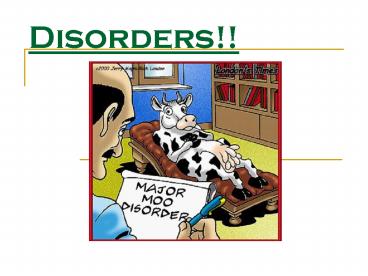Disorders - PowerPoint PPT Presentation
1 / 12
Title: Disorders
1
Disorders!!
2
Anxiety Disorders
- Anxiety increased heart rate, rapid breathing,
sweating, dry mouth, sense of dread. - When it becomes intense Anxiety Disorder
- PHOBIA strong, irrational fear. Phobic usually
realizes what is going on. - Social Phobia
- Agoraphobia
3
Anxiety Disorders
- Generalized Anxiety Disorder long lasting free
floating anxiety. Cannot pinpoint source for
feelings of anxiety - Panic Disorder panic attacks are suffered.
Sometimes leads to people constantly worrying
about panic attackscan lead to agoraphobia - Obsessive-Compulsive Disorder (OCD) persistent,
often upsetting thoughts that may produce strong
urges to perform repetitive, ritualistic
behaviors. They are constant intrusions and may
severely impair daily activities.
4
Somatoform Disorders
- Symptoms of a disorder w/o physical cause.
Appear to be psychological disorders taking
physical form. - Conversion Disorder (hysteria) appears to be,
but is not blind, deaf, paralyzed, etc - Tend to appear only under severe stress
- They often help reduce that stress by removal
from the stressful situation - Person shows little concern about the problem.
- Symptoms may be organically impossible/improbable
5
Somatoform Disorders
- Hypochondriacs strongly, but unnecessarily, fear
illness, often reporting vague symptoms. - Pain Disorder severe, constant pain with no
physical cause. Often develops after a physical
trauma. Pains intensity often increases when
under stress. Prevents one from engaging in
activitiesespecially disliked activities.
6
Dissociative Disorders
- Rare, marked by temporary disruptions in memory,
identity, or consciousness - Dissociative fugue one suddenly loses all
autobiographical memory, often assuming a new
identity in a new locale. - Dissociative Amnesia sudden memory loss, one
usually retains some autobiographical memory - Dissociative Identity Disorder (DID) person
displays more than one identity, each of which
may speak, act, and write differently. Each
personality has its own memories, wishes,
impulses, and even distinct biological features.
Shifts are often sudden, dramatic, and often
stress related (Split Personality)
7
Mood Disorders
- Also called Affective Disorders, involve extremes
of mood, especially if the mood extremes are
inconsistent with the events around the person - Major Depression sad or hopeless for long
periods of time often one loses all interest in
activities. Symptoms feelings of guilt,
inadequacy, worthlessness changes in eating
habits, body weight, sleep problems, poor
concentration.
8
Mood Disorders
- Dysthymia one has sad mood, lack of interest,
and loss of pleasurein a milder form and spread
out for at least two years. Can still function
reasonably well. - Bipolar Depression (bipolar I) (Manic
Depression) alternating appearance of two
emotional extremes. Major depression Mania
9
Schizophrenia
- Causes severely disturbed thought, emotion,
perception, and behavior. Can dramatically
impair ones ability to communicate with others
or engage in daily functioning. - About 1 of the populationequal among men and
women. Tends to strike in adolescence or young
adulthood.
10
Schizophrenia
- split occurs between mental faculties, so that
ones emotions may be at odds w/ ones thoughts
or perceptions - Display disordered thought
- Auditory Hallucinations
- Flat affect-little or no emotion
- Some appear agitated
- Low motivation, poor social skills, poor personal
hygiene are common - Has a genetic component
- YouTube
11
Types of Schizophrenia
- Paranoid Schizophrenia delusions of persecution
or grandeur accompanied by anxiety, anger,
superiority, argumentativeness, or jealousy.
Most cases a person can complete school, hold a
job and family, before problems become too
severe. - Disorganized Schizophrenia unrelated delusions
and hallucinations, incoherent speech, flat
affect, and neglected personal hygiene
12
Personality Disorders
- Long-standing, inflexible ways of behavingcan
create problems for those who display them or for
others. - Schizotypal personality disorder some of the
odd, eccentric features of schizophreniabut
not disturbed enough to be diagnosed - Avoidant P.D. anxious, fearful similar to
social phobia, but they desire to be with
othersextra-sensitive to criticism - Narcissistic P.D. exaggerated sense of
self-importance and lack of empathy for others - Anti-Social Personality long term pattern of
irresponsible, impulsive, behavior beginning
early in life. Includes superficial charm,
poise, verbal skill, lack of guilt or shame,
absence of any real feelings.































